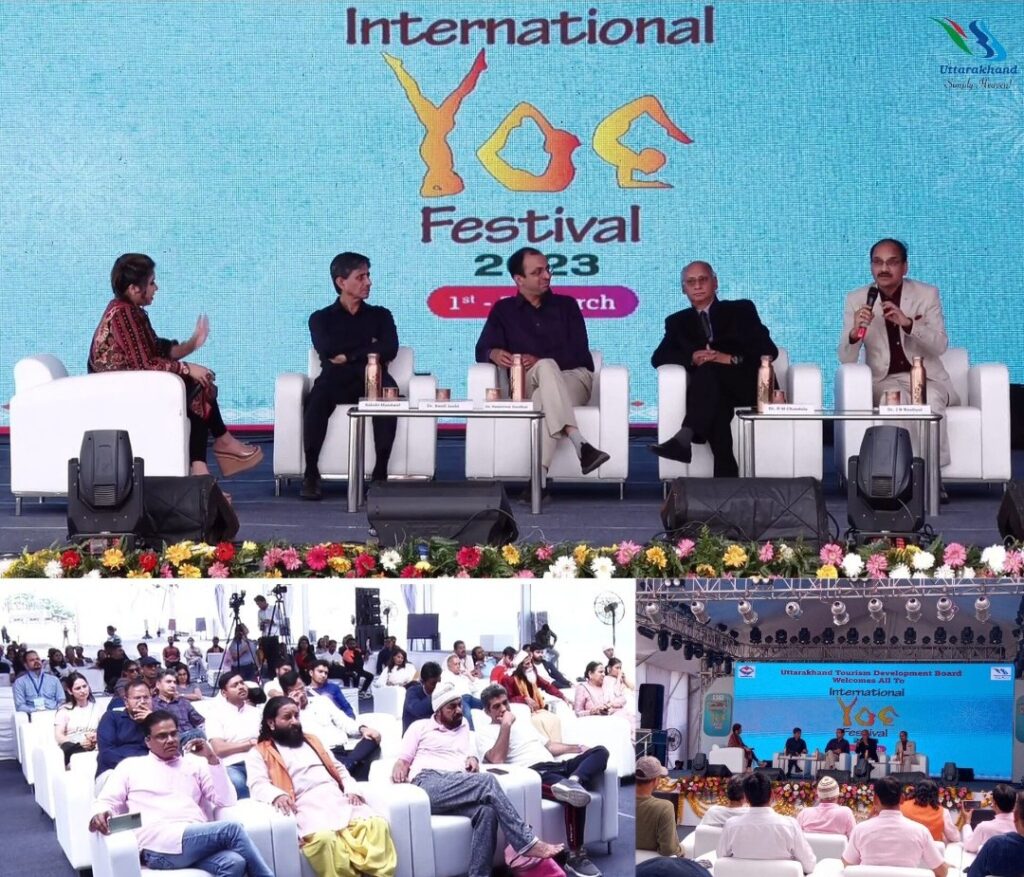Email: home@ayushline.com

Holistic health, holistic life

Holistic health, holistic life

‘Ayurveda-The Science of Life’ was the topic for panel discussion that took place on 5th March 2023, Day 5 of International Yoga Festival 2023 at Rishikesh, Uttarakhand.
The expert panelists included:-
Dr Sunil Kumar Joshi, Vice Chancellor of Uttarakhand Ayurved University, Dehradun. He has an experience of over 36 years in the field of Shalya Chikitsa (Ayurveda surgery) in India as well as abroad. He has published 11 books in Ayurveda by his name.
Dr Sanjeevan Deodhar, MBBS, MSc, MBA. Founder and Director at Vatsal Ayurvedic Products and Prachet Lifetech Pvt. Ltd. from Nashik, Maharashtra.
Dr Hari Mohan Chandola, MD, PhD Ayurveda. Chairman of Research Committee and the Institutional Ethics Committee at Uttarakhand Ayurved University, Dehradun.
Dr J N Nautiyal, MD Ayurveda. Renowned Ayurveda Physician and Panchakarma Wellness Expert. He has been Senior Ayurveda Physician at Government Doon Hospital, Dehradun. Presently, he is the President of Bhartiya Chikitsa Parishad, Uttarakhand.
Few excerpts from the discussion:-
Q. Ayurveda has its roots deeply embedded in our culture. Could you please enlighten our audience today about Ayurveda-the science of life.
Dr Sunil Kumar Joshi- Ayurveda is the oldest way of healing in the world. Ayurveda has two basic aims, first to protect us from the disease and second to cure the disease if already occured. With help of Ayurveda principles, we can fulfill the dream of health for all in the world. Being one of the oldest medical system in human civilization, Ayurveda is the mother science of all other Medical Sciences.
Q. Common people tend to associate the word ‘medicine’ with typically just medicine or drug but Ayurveda is beyond medicine. Could you share some light on this aspect.
Dr J N Nautiyal- Ayurveda is not just the science of life, but also the art of life. Beyond medicine, there are many other super speciality branches in Ayurveda like Shalya Chikitsa (Ayurveda surgery), Marma therapy, Leech therapy, Panchakarma therapy etc. Ayurveda Panchakarma therapy can detoxify the human body from different kind of metabolic wastes which are generated due to pollution, adulterated food or due to our wrong lifestyle. Such timely detoxification of body can get rid us of various serious diseases ranging from Infections to even cancers. Moreover, unlike other detoxification methods prevalent in various parts of world, Ayurveda Panchakarma detoxification methods are very mind & body friendly. Infact, a toxin free body is prime requisite for a successful journey in the path of Yoga practice.
Q. Could you please tell us about the Panchakarma detoxification methods of Ayurveda in detail.
Dr J N Nautiyal- There are many activities involved in Panchakarma. First of all Snehan (oleation), external as well as internal, is done to lubricate the metabolic toxins at the cellular level. Then medicated steam also known as Swedan (sudation) is done to liquify those lubricated toxins. Snehan & Swedan are Poorvakarma (prepatory procedures). Then starts the main Panchakarma (Five procedures) including Vaman, Virechan, Vasti, Nasya and Shiro-virechan. By these main Panchakarma therapies, all the lubricated and liquified metabolic toxins are expelled out of the body. Moreover, the diseases treated with help of Panchakarma detoxification have the least recurrence rate unlike the case in the diseases treated with help of just medicines.
Q. How can we cure some common widespread ailments in the world like joint pain through Ayurveda ?
Dr Hari Mohan Chandola- Ayurveda is not merely a system of medicine, rather it is a way of life. Ayurveda is eco friendly, cost effective and toxicity free. Due to its holistic approach, Ayurveda talks about the integration between body, mind and soul. Ayurveda is preventive, promotive and curative in nature. In fact, the ultimate objective of Ayurveda is to attain Moksha (salvation) through the path of yoga. And for yoga your body needs to be physically fit and mentally alert. That is why it is said that Yoga is an integral part of Ayurveda.
In terms of diseases or ailments, Ayurveda contributes firstly, in psychosomatic paradigm of health; Secondly, Rasayan (Ayurveda rejuvenation) can help in curing degenerative conditions like joint pain; Thirdly, herbal based formulations, medicines, decoctions etc. can help a lot in diseases ranging from joint pain to different types of cancers.
Q. Dr. Deodhar, how do you see the blend of modern medicine with the ancient Ayurveda science ?
Dr Sanjeevan Deodhar- Actually, I will not say modern medicine rather it’s western medicine. Even the western thinking as a whole is such that they divide the subject matter in small small pieces and then study. Whereas in eastern philosophy and Ayurveda-the science of life, there is holistic approach; They combine things together and then study. Western medicine has specialist for every part of body like ear, nose, throat specialist. Maybe in future they can have left ear specialist and right ear specialist as well.
Nowadays, in many parts of world, western medicine has also started accepting many Ayurveda principles as true. For example- Firstly, ‘cure the diseased not the disease‘. According to Ayurveda, every individual is different in terms of their own Prakriti (bio-constitution). Therefore, the medicine or treatment given should be individualised. Therefore, new branches have been added to western medicine like pharmacogenetics and pharmacogenomics. Now, they have started studying how each and every person handles the medicine differently. Secondly, ‘only drug can not cure the disease‘. According to Ayurveda, there is a combination of four factors which cures the disease namely- faith of the patient on Vaidya (doctor), ability of patient to follow the instructions given by Vaidya, actual condition of disease, fourth is the medicine or drug. Therefore, now, western medicine seeks help of psychologists to help patients get treated well. Thirdly, ‘caring for the environment‘ or caring for the entire biome not just the human being is also essential to ensure overall Health and Wellness of entire humanity.
I believe that this is the process of evolution in the beginning which will gradually lead to the universal acceptance of Ayurveda in all parts of globe. But we can not just sit & wait for this evolution to complete. Therefore, to the modern generation of our society, I would suggest to at least study the basic principles of Ayurveda and try to implement them and see positive changes in their health.
Q. For a beginner, how to start adopting Ayurveda in our day-to-day lifestyle ?
Dr Sunil Kumar Joshi- There is an Ayurveda principle ‘yat pinde tat brahmande‘ which means ‘So is the human body, so is the Cosmos’. Therefore, we should adapt our body in accordance with the changes in our environment. There should be harmony between our body and the universe. For example, when sun rises we should also get up and should sleep early in the night. We should follow the principles of Dincharya (Ayurveda daily regimen) and Ritucharya (Ayurveda seasonal regimen).
The entire history of medicine in the world can be divided into two parts- ‘Before corona’ and ‘After corona’. We have seen the limitations of all modern medical sciences and we have also seen the benefits of Ayurveda during corona pandemic. In fact, Ayurveda principles have always provided the ways to prevent all kind of communicable diseases ever. Therefore, Ayurveda is universally sustainable and universally acceptable system of medicine.
You must be logged in to post a comment.
Nice
Thank you
Very true said by Dr Chandola sir, Ayurveda is not merely a system of medicine but it is a complete way of life..
Indeed
Very insightful interview it was. I practice Panchakarma in Nasik. I learn more from Keraliya Panchkarma therapy